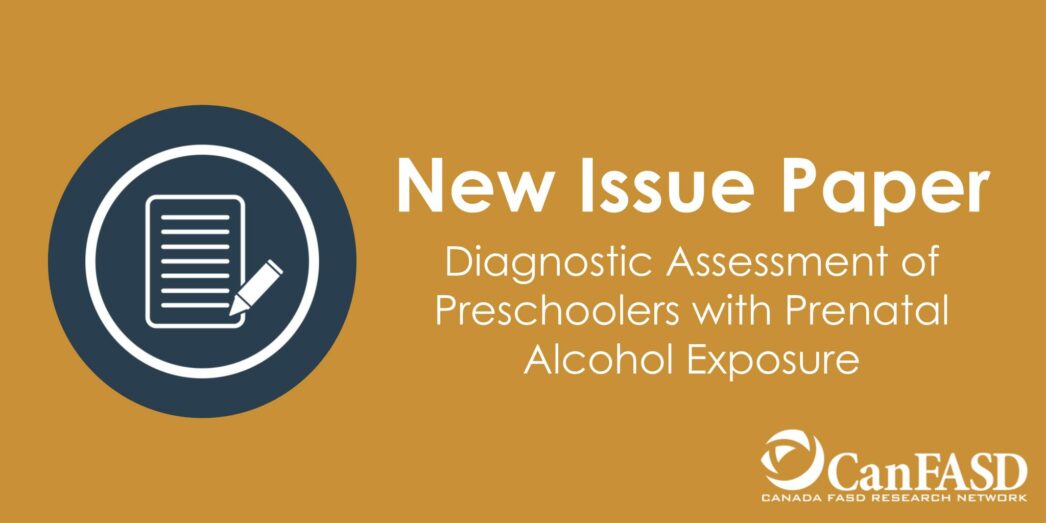CanFASD recently released a new issue paper Diagnostic Assessment of Preschoolers with Prenatal Alcohol Exposure. Below is a short summary. You can find the full issue paper here.
Issue:
Diagnostic assessment of preschoolers (aged 0-5) with prenatal alcohol exposure (PAE) can be an early opportunity to identify behaviour and learning challenges and provide appropriate early intervention. However, diagnostic assessment in this age group can be difficult. It is well established that early interventions and diagnosis are critical to supporting healthy outcomes in the future. However, there is a limited body of research focused on FASD diagnosis in preschool aged children and a reluctance among clinicians to provide a definitive diagnosis at this age.
Background:
- Recent Canadian data has shown that of the 260 preschoolers assessed for FASD in the sample:
- 9% were diagnosed with FASD with sentinel features
- 8% received a diagnosis of FASD without sentinel features
- 4% were given an at-risk designation
- Researchers have shown that the impacts of PAE are evident in early development:
- A review showed global impacts of PAE on physiological areas including sleep, arousal, attention regulation, emotion, mood, behavioural regulation, and executive functioning in early development.
- Research on brain development shows infants and preschoolers with PAE have neurological changes that influence multiple domains of functioning. These changes can be assessed using typical multidisciplinary assessment tools used in preschool assessment.
- Clinicians and researchers are often concerned about diagnosing FASD in preschoolers because of:
- A limited number of standardized tools to assess preschoolers, which requires specialized training to properly interpret results; and
- Concerns about attributing developmental delays to PAE alone, as other adverse childhood experiences can also impact development.
- Clinical confidence in assessing preschoolers is impacted by the clinician’s experience.
Diagnostic Issues:
Researchers have shown that assessment and diagnosis in this age group is possible. However, clinicians often defer a diagnosis of FASD in preschoolers because current assessment tools may not detect developmental differences in language and learning at young ages.
- Diagnostic assessment in this age group should be done by a clinical team experienced in preschool assessment, however few Canadian diagnostic clinics currently offer preschool assessment.
- More research is needed to identify the most appropriate diagnostic tools for this age group.
Benefits of Early Diagnosis:
Early recognition and diagnosis are critical to ensuring early intervention, appropriate management, and dedicated support. Early diagnosis can:
- Reduce the impact of risk factors on outcomes
- Support and enrich protective factors
- Reduce mislabelling of behaviour
- Build a circle of community support and increase access to supports and services
- Provide caregivers and service providers with tools needed to modify the child’s environment for success
- Reduce the burden of care on families by offering intervention at an early age
Take Home Message
An FASD diagnosis in preschool aged children is possible, but further research and refinement for assessment is needed to support clinicians and diagnostic teams. Although identification and assessment of preschoolers is accompanied with complex risk factors, an early comprehensive assessment of cognitive and behavioural functioning in diagnosis will better inform and support optimal life outcomes.
For more information, including recommendations, please read the full issue paper here.
Authors: Ana Hanlon-Dearman, Kellsey Scheepers & Shae Mulvihill
Date: January 2023

